Of all of the bands that emerged post-punk, one of the most intriguing was SHRIEKBACK.
Formed in 1980 by ex-XTC keyboardist Barry Andrews, bassist Dave Allen ex-GANG OF FOUR and guitarist Carl Marsh from OUT ON BLUE SIX, they subverted much of the commercial pop music of the time, carefully avoiding many of the clichés rife during that era.
Songs such as ‘My Spine (Is the Bassline)’ and ‘All Lined Up’ melded intelligent lyrics with bass-driven funk and the album ‘Oil & Gold’ saw the band getting a big production Fairlight sheen and a collaboration with Hans Zimmer.
Although the band reached a wider audience through their music being used by Hollywood director Michael Mann, SHRIEKBACK never truly gained the recognition or chart success that they richly deserved.
A Kickstarter-funded campaign saw the band return to the live stage last year and a new album in the form of ‘Why Anything? Why This?’.
Barry Andrews and Carl Marsh kindly spoke about their early years, the pivotal ‘Oil & Gold’ album and new release ‘Why Anything? Why This?’.
How do you feel about being referred to as a “post-punk new wave supergroup”?
Carl: As labels go, it’s not a bad one. I certainly felt quite privileged when I ended up in a band with members of two of my favourite groups. Having said that, I reckon after 14 albums we’ve probably transcended the label. 37 years is an awful lot of ‘post’.
Older tracks like ‘All Lined Up’ helped to make slap bass ‘cool’ in an era where LEVEL 42 were hell-bent on doing the exact opposite; were the songs often written around Dave Allen’s basslines or was this usually added afterwards?
Carl: Those tunes were all built from the groove up, so Dave’s bass would’ve been one of the very first things to go on. Sometimes what you’re hearing is actually two bass parts, often a solid bottom end and the slap part – The Gank – on top. And usually the bass just steams through the whole track – very rarely in those days did we grudgingly change anything to accommodate – gasp – a chord change or something.
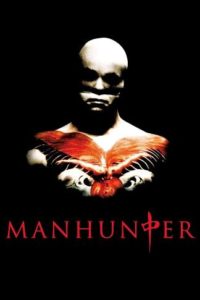 How did the link up with Michael Mann happen and looking back, what are your thoughts about the usage of SHRIEKBACK tracks in the film ‘Manhunter’?
How did the link up with Michael Mann happen and looking back, what are your thoughts about the usage of SHRIEKBACK tracks in the film ‘Manhunter’?
Carl: I can’t recall being involved in any discussion about it – I think he was just a fan, so, y’know, “His People” called “Our People”. I think the music works very well in the film, it adds to the atmosphere very appropriately. It certainly introduced us to a whole bunch of listeners who would probably not have heard us otherwise.
Barry: We were ‘used’ in Mann’s earlier TV thing ‘Miami Vice’ and one thing led to another, I guess. There’s ‘Faded Flowers’ in his dodgy feature ‘Band of the Hand’ also.
‘Evaporation’, which features in ‘Manhunter’, has some really haunting vocoder work in it, can you tell the story behind this track?
Barry: The first song we wrote which was a meditation on death (though far from the last), but the person who was confronting the Reaper in this case was our downstairs neighbour Mr Scrivens – an almost self-parodic old gent (retired watchmaker) who, one day, just disappeared and we went down to look at all his shit in his flat. A whole life in objects: a lock of his dead wife’s hair, a book of Shelley’s poems from a very ex-lover (1941) and so on. Made quite an impression. Musically, it was our first attempt to wean Dave away from the trademark GANG OF FOUR Gank into deep 40Hz-heavy dub-fullness. Which he feared, then fulsomely embraced.
The vocoder here is being used as both effect and proto pitch correction since the melody is quite developed and I don’t have the sort of voice that can sing those so the keyboard plays the tune and I intone through it. The vocal-less piano version on my solo album ‘Haunted Box of Switches volume 2’ is interesting since you hear the melody naked for the first time.
‘This Big Hush’ is a beautifully sensual and well-loved SHRIEKBACK track, to the point where in some of the YouTube comments for the song, people have expressed a desire to have it played at their funerals, how do you feel about that and what are you memories of producing this song?
Barry: Yes, it’s very gratifying to hear things like that. The great thing about pop music is it soundtracks people’s lives (and deaths). Quite a privilege. It was a bit of a bitch to do actually – we recorded the whole thing about 10 bpm faster – put shed loads of overdubs on it then I had a panic attack and realised it had to be slower so we did it all over again. I was rather unpopular for a bit!
Clare Torry (most famous for ‘The Great Gig in the Sky’ vocal on ‘Dark Side of the Moon’) sang backing vocals on ‘This Big Hush’; there are times where female backing vocals give the band a PINK FLOYD-style aesthetic, are you fans and was this deliberate?
Carl: Clare came in at Hans Zimmer’s suggestion and ended up doing a few tracks on ‘Oil & Gold’; there was no intention of adding a consciously Floydian sound. I seem to remember that she was sick of people asking her to “do the Great Gig thing, go on!” anyway… though of course she’s done very, very well out of it.
No, I’m not a big Floyd fan, although I did own a copy of ‘Dark Side Of The Moon’ – I think it was illegal not to at the time. These days I’m more likely to listen to the early stuff – Telecasters with the treble turned up to stun.
Clare had signalled ahead of the session that she was not going to do That Thing so don’t ask. Then she had to head off to another session before she’d done all she was supposed to do for us, so she felt guilty and did it anyway. Result.
The ‘Oil & Gold’ album had some pretty big budget synths on it like the Fairlight and Jupiter 8, how challenging was that kind of technology to use back then?
Barry: Lillie Yard Studios was Stanley Myer’s place (he of ‘The Deer Hunter’ theme) where Hans Zimmer was his young apprentice – Hans was engaged as the producer for ‘Oil & Gold’ but we didn’t really get on aesthetically and we ended up sacking him.
He was though indeed the conduit to some of this technology – especially the Fairlight which took a bit of working out but was not actually as terrifying as people made out – there was a technocratic hierarchy thing going on in those days which we arse-ily (and righteously) stood against.
Early SHRIEKBACK tracks were often underpinned by drum machines, but then there was a transition into live drums (continuing on the current album), was there any particular reason for this?
Carl: The reason, very simply, was – and still is – Mr Martyn Barker. With an endless fountain of inspiring and impeccably played groovage, who’s gonna dick around bashing a drum machine?
Plus he continues to make a valiant attempt to stop me and Barry getting too far up our arty selves.
Barry: Yeah amen to that. It’s a whole level of detail you get with Mart’s work that makes the musical experience deeper: more complex and subtle, I think. Wood carving instead of Formica.
John Peel was a fan of the band, how was the experience of doing sessions for his iconic radio show?
Carl: Mostly great, especially the ones we did more as the live band, as opposed to attempting to recreate the records – as we didn’t actually ever own a Linn Drum, I had to load the patterns into a hired one from a cassette, which quite often didn’t work and meant I was up most of the previous night re-programming them from scratch. Another reason to love Mart. But being let loose in Maida Vale is a real kid-in-a-sweetshop experience. Fantastic place – closing down now, sadly.
Barry: My experience was a bit more jaundiced I fear. The studios were great but the BBC in those days was a Job-For-Life kinda set up where tired listless engineers would grudgingly (and after a long and liquid lunch often) phone in their jobs. They were not at all interested in pushing any envelopes and knocked off at 5 on the dot. It was a good discipline in getting your shit together ahead of time though. Not something the Shrieks of the early 80s were famous for.
You toured with SIMPLE MINDS in 1985, what was that experience like and what kind of reception did you get from the Minds’ fans?
Barry: It was really quite an amazing time! I had met the Minds when I was working with Iggy Pop at Rockfield Studios in ‘79 and they were working with John Leckie who was XTC’s first producer.
Me and Steve New joined them (Minds) onstage at a studio party singing Iggy’s ‘TV Eye’ in the style of Derek and Clive. So there was a fairly matey vibe going down when we hooked up to do an extended and experience-rich double tour of the States.
It was a good fit because we brought in the weirdos and they got the mainstream people who had seen ‘The Breakfast Club’. We were a hooligan good live band at the time and fluffed the crowd well for them, I think, and that was appreciated. The Glasgow show was something else though: when you had SIMPLE MINDS (the biggest Scottish band EVER) Return To Their People prefaced by this bunch of freaks from (gulp) London. We kept it short!
SHRIEKBACK have always had cerebral song titles and lyrics with ‘Nemesis’ featuring the now infamous rhyming of its title with “parthenogenesis”; are there other particular SHRIEKBACK lyrics you are especially proud of?
Carl: Hmmm. I was quite pleased with ‘My Spine (Is The Bassline)’ at the time. THE POLICE released ‘Synchronicity’ around the same time and I heard Sting on the radio smugly asserting that no-one else would use that word in a pop song. The DJ Richard Skinner, had to tell him that some upstarts called SHRIEKBACK had beaten him to it. That shut him up. Very satisfying.
‘Everything That Rises Must Converge’ springs to mind, for some reason. The hardest one was almost certainly ‘Beyond Metropolis’, coming up with about fifteen multi-syllabic, pseudo-Greco-Latin city names and then having to sing them. What was I thinking? I like ‘Catmandu’ on the new album – it’s clever, but more importantly, it’s funny.
The current album is superb and one that if recorded by (say) PJ HARVEY or THE THE could potentially be up for a Mercury Music Prize… are you pleased with the end result?
Carl: Thank you. Woo, a Mercury Prize – do I have to buy a suit? Yes, I’m very pleased with it. It was a lot of work, but also a lot of fun, a very rewarding process. It’s hard to judge when you’re so close to it, but it sounds to me like it could appeal to a lot of people outside the hard-core SHRIEKBACK fan-base, if they get the opportunity to hear it.
Several tracks on ‘Why Anything? Why This?’ seem tailor-made for soundtracking a dark, deep south ‘True Detective’-style Netflix series, what is it about certain SHRIEKBACK songs that seem to evoke that kind of feeling?
Carl: Something like ‘And The Rain’ definitely ticks all those boxes – brooding, dark, apocalyptic, with the gritty slide guitar and that Southern Gothic thing going on. We are friends with the dark, I suppose!
There are a few welcome synth solos including a talkbox one on ‘Sons Of The Dirt’ on the new album, aren’t they a bit of lost art?
Carl: Well, the one on ‘Sons Of The Dirt’ is mine, my first, I think, so for me it’s a new art, not a lost one. Plus I don’t really like doing guitar solos – I’m more about rhythms and textures – so we have to put something in there instead. Luckily, Barry is willing and more than able to step up. That one on ‘Thirty Seven’ is a banger, innit?
SHRIEKBACK albums have been recorded on a variety of budgets, what are you viewpoints on advances in technology which allow pretty much anybody with a Mac and Logic / Pro-Tools to produce music?
Carl: It’s brilliant. Not being tied to expensive studios – and, by extension, a record company – gives you so much freedom, and the process can be very collaborative. We couldn’t have made this record any other way. Of course, without financial or scheduling constraints, you have to be disciplined enough to know when to stop, or you go on forever trying just one more plug-in. And the fact that anyone can do it means that there’s a bewildering amount of stuff out there, so the battle becomes about differentiating yourself from all the background noise.
You’re onto album number 14 now, has there been enough interest in getting some of your other earlier albums remastered? Is this something which will ever see the light of day?
Barry: Well we’ve done ‘Tench’, ‘Jam Science’ and ‘Care’, although since all the masters are lost in the miasma of various takeovers (Arista to BMG to Universal, say), it’s arguably a bit pointless. We can get an old CD, tweak it sonically a bit and stick ‘em in a new cover but hey… ‘Big Night Music’ is left. We’re inclined, in the words of La Smith, not to fuck so much with the past but fuck plenty with the future…
You played a show in London last year, how was this experience and are there any plans for a bigger tour?
Carl: The Shepherds Bush show was a blast – we had a very well-rehearsed 8-piece band and we were able to deliver a good cross-section of the catalogue to a roomful of people who’d been waiting years to hear it. However, that was only possible because we had enough loyal and generous fans to float it via a Kickstarter campaign.
Unfortunately, we’re struggling to make it self-sufficient and sustainable – the 8-piece is just too big a beast to keep fed. We’re working through other ideas and formats, but as yet we haven’t found a way that will give us and the audience what we both want. Unlike the recording scenario, technology and the internet have not combined to make touring cheap and simple – it’s still wages, rehearsal rooms, transport, accommodation… sad but true.
If you could each pick a SHRIEKBACK track as an introduction for a new listener to the band’s music, what would you choose?
Carl: That’s tough, there’s a lot of very different things to choose from. The default answer would probably be to start with something on ‘Oil & Gold’, as that album represented a certain peak for the band, captured something of both our live and studio sound and has stood the test of time. But I think I’d honestly say start with the new album – it’s a real band album and it covers a good range of SHRIEKBACK’s territory. Then you can get into the weird shit.
Barry: Err, my all-time faves presently are:
‘Beyond Metropolis’ (‘Without Real String or Fish’)
‘This Big Hush’ (‘Oil & Gold’)
‘Amaryllis In The Sprawl (‘Glory Bumps’)
‘Evaporation’ (‘Care’)
‘Semi-Delicious’ (‘Life in the Loading Bay’)
‘And the Rain’ (‘Why Anything? Why This?’)
If you don’t like them, then I don’t know what to tell ya…
ELECTRICITYCLUB.CO.UK gives its grateful thanks to SHRIEKBACK
Special thanks to Shauna McLarnon at Shameless Promotion PR
‘Why Anything? Why This?’ is released by Shriek-Related Products as a CD which is available direct from https://www.shriekback.com/store, download via the usual digital outlets
https://www.facebook.com/shriekback/
https://twitter.com/shriekbackmusic
https://www.burningshed.com/store/shriekback/
Text and Interview by Paul Boddy
Live Photos by Howard Davidson
23rd June 2018

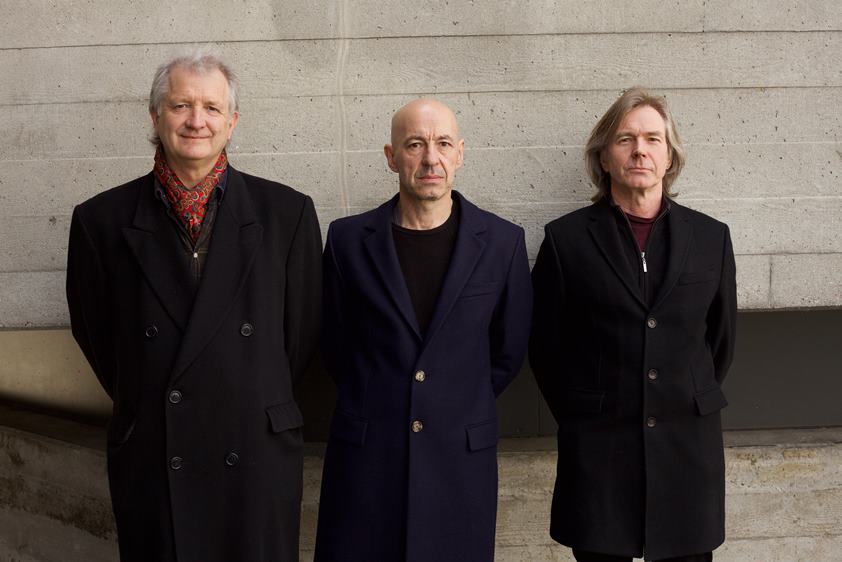
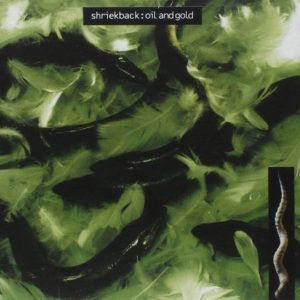
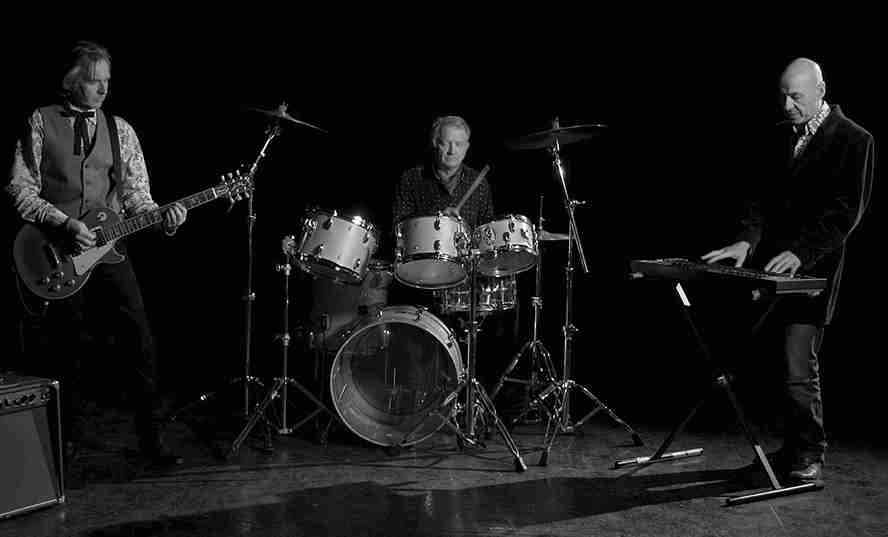
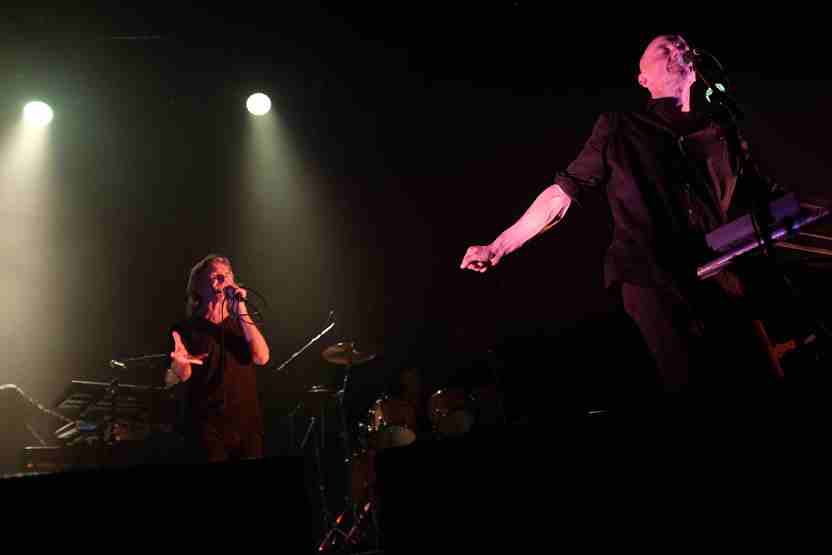
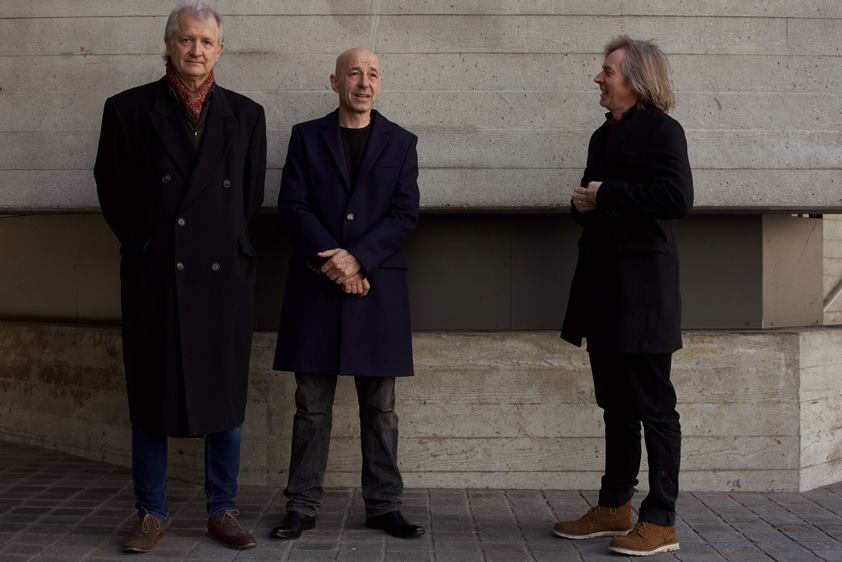

Follow Us!